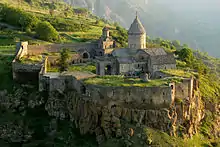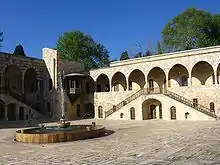Heritage tourism
Cultural heritage tourism (or just heritage tourism or diaspora tourism) is a branch of tourism oriented towards the cultural heritage of the location where tourism is occurring.
The National Trust for Historic Preservation in the United States defines heritage tourism as "traveling to experience the places, artifacts and activities that authentically represent the stories and people of the past",[1] and "heritage tourism can include cultural, historic and natural resources".[1]
Culture
Culture has always been a major part of travel, as the development of the Grand Tour from the 16th century onwards attests. In the 20th century, some people have claimed, culture ceased to be the objective of tourism; tourism is now culture. Cultural attractions play an important role in tourism at all levels, from the global highlights of world culture to attractions that underpin local identities.[2]
Culture, heritage and the arts have long contributed to appeal of tourist destination. However, in recent years 'culture' has been rediscovered as an important marketing tool to attract those travellers with special interests in heritage and arts.[2]
According to the Hollinshead, cultural heritage tourism defines as cultural heritage tourism is the fastest growing segment of the tourism industry because there is a trend toward an increase specialization among tourists. This trend is evident in the rise in the volume of tourists who seek adventure, culture, history, archaeology and interaction with local people.
Cultural heritage tourism is important for various reasons; it has a positive economic and social impact, it establishes and reinforces identity, it helps preserve the cultural heritage, with culture as an instrument it facilitates harmony and understanding among people, it supports culture and helps renew tourism.[2] As Benjamin Porter and Noel B. Salazar have ethnographically documented, however, cultural heritage tourism can also create tensions and even conflict between the different stakeholders involved.[3]
Cultural heritage tourism has a number of objectives that must be met within the context of sustainable development such as; the conservation of cultural resources, accurate interpretation of resources, authentic visitors experience, and the stimulation of the earned revenues of cultural resources. We can see, therefore, that cultural heritage tourism is not only concerned with identification, management and protection of the heritage values but it must also be involved in understanding the impact of tourism on communities and regions, achieving economic and social benefits, providing financial resources for protection, as well as marketing and promotion. (J. M. Fladmark, 1994)
Heritage tourism involves visiting historical or industrial sites that may include old canals, railways, battlegrounds, military sites, etc. The overall purpose is to gain an appreciation of the past. It also refers to the marketing of a location to members of a diaspora who have distant family roots there.
Immigration
Decolonization and immigration form the major background of much contemporary heritage tourism. Falling travel costs have also made heritage tourism possible for more people.[4]
Another possible form involves religious travel or pilgrimages. Many Catholics from around the world come to the Vatican and other sites such as Lourdes or Fátima. Islam commands its followers to take the hajj to Mecca, thus differentiating it somewhat from tourism in the usual sense, though the trip can also be a culturally important event for the pilgrim.[5]
Heritage tourism can also be attributed to historical events that have been dramatised to make them more entertaining. For example, a historical tour of a town or city using a theme such as ghosts or Vikings. Heritage tourism focuses on certain historical events, rather than presenting a balanced view of that historical period. Its aim may not always be the presentation of accurate historical facts, as opposed to economically developing the site and surrounding area. As a result, heritage tourism can be seen as a blend of education, entertainment, preservation and profit.[6]
Indigenous peoples
Anthropology and Ethnology were two major disciplines interested by the life of aborigines, their customs and political structures.[7] Although, the firsts fieldworkers were not interested in expanding the colonization of main European powers, the fact was that their notes, books and field-work notes were employed by colonial officials to understand the aboriginal mind.[8] From that moment on, anthropology developed a strange fascination for the Other's culture.[9] The concepts of heritage and colonization were inextricably intertwined.[10]
Another problem with heritage tourism is the effect on indigenous peoples whose land and culture is being visited by tourists. If the indigenous people are not a part of the majority, or ruling power in the country, they may not benefit from the tourism as greatly as they should. For example, in Mexico tourism has increased because of the predicted end of the Maya Calendar. However, some activists claim the indigenous Maya are not benefitting from the increased traffic through the ruins and other cultural landmarks.[12]
Cultural tourism
Promotion and facilitation
Heritage tourism is supported by municipalities through promotion and tourist information in many countries and their administrative units, e.g. cities as Polish Bydgoszcz[13] or Warsaw.[14]
There are also many forms of presenting selected tourist topics in a harmonized way, for instance European Route of Brick Gothic[15] and many others (Cultural Route of the Council of Europe).
See also
- Heritage interpretation
- List of heritage railways
- World Heritage Site
- Genealogy tourism
- Door of Return
- Year of Return, Ghana 2019
- Overseas Citizenship of India, a scheme allowing foreign citizens with ancestral origins in British India to obtain permanent residency in India
- Birthright Armenia
- Right of return
- Diaspora politics
Notes
- "Heritage Tourism". National Trust for Historic Preservation. Retrieved 4 April 2014.
- Richards, Greg (1996). Production and consumption of European Cultural Tourism. Annals of Tourism Research. Tillburg University Press.
- Porter, Benjamin W. and Noel B. Salazar (2005). "Heritage tourism, conflict, and the public interest". International Journal of Heritage Studies. 11 (5): 361–370. doi:10.1080/13527250500337397.
- Winter, T. (2007). Post-Conflict Heritage, Postcolonial Tourism: Tourism, Politics and Development at Angkor. Routledge. ISBN 041543095X
- Basu, P. (2007). Highland homecomings: Genealogy and heritage tourism in the Scottish diaspora. Routledge.
- Timothy, D., & Olsen, D. (Eds.). (2006). Tourism, religion and spiritual journeys. Routledge.
- Harris, M. (2001). The rise of anthropological theory: A history of theories of culture. AltaMira Press.
- Restrepo, E., & Escobar, A. (2005). ‘Other Anthropologies and Anthropology Otherwise’Steps to a World Anthropologies Framework. Critique of Anthropology, 25(2), 99-129.
- Clifford, J., Dombrowski, K., Graburn, N., LeiteGoldberg, N., Phillips, R., Watkins, J., & Clifford, J. (2004). Looking several ways: Anthropology and native heritage in Alaska. Current anthropology, 45(1), 5-30.
- Starzmann, M. T. (2008). Cultural imperialism and heritage politics in the event of armed conflict: prospects for an ‘activist archaeology’. Archaeologies, 4(3), 368-389.
- "Community Tourism - Number2 River Association, Sierra Leone". The Vrinda Project. YouTube. Retrieved 4 April 2014.
- "Mayans Demand Inclusion in 'Doomsday Tourism'". Indian Country Today Media Network. 21 January 2012. Retrieved 4 April 2014.
- "Visit Bydgoszcz". Bydgoszcz Information Centre (Bydgoskie Centrum Informacji). Retrieved 5 December 2017.
- "WarsawTour". Warsaw Tourist Office. Retrieved 5 December 2017.
- "Europäische Route der Backsteingotik". Europäische Route der Backsteingotik e.V. Retrieved 5 December 2017.
External links
| The Wikibook Development Cooperation Handbook has a page on the topic of: Community Tourism |
- Family Heritage Tourism
- Cultural Heritage Tourism
- EUHeritageTOUR
- Culture and Heritage Travel Challenge
- Heritage Tourism from the National Trust
- Weblog and Information on UNESCO World Heritage Topics
- European Route of Industrial Heritage
- (in English) Cultural Heritage and Religious Tourism packages in Romania, Europe
- European Routes of Jewish Heritage and guide to synagogues and other Jewish heritage sites in Slovakia
- Success factors for museums & non-profit cultural attractions
- South-East Asian Tourism Organisation A new South-east Asian based organization looking at ways to use other initiatives to spread the benefits of tourism more widely.
- Heritage Hotels in India



